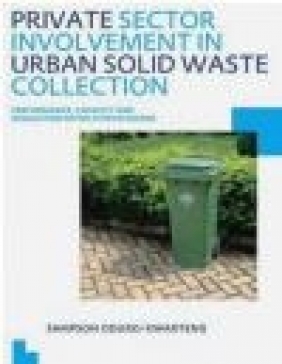Private Sector Involvement in Urban Solid Waste Collection
Sampson Oduro-Kwarteng
Private Sector Involvement in Urban Solid Waste Collection
Sampson Oduro-Kwarteng
- Producent: Taylor & Francis
- Rok produkcji: 2011
- ISBN: 9780415692779
- Ilość stron: 200
- Oprawa: Miękka
Niedostępna
Opis: Private Sector Involvement in Urban Solid Waste Collection - Sampson Oduro-Kwarteng
The private sector involvement in public service is intended to achieve efficiency gain and better service quality through increasing private sector finance and expertise. However, these benefits are most often not achieved in developing countries due to investment risk of private finance, and problems of capacity and regulation of the private sector. This book examines private sector involvement (PSI) in solid waste collection by exploring the influence of private sector capacity and Local Governments' regulations on private sector performance in terms of productivity and service quality. PSI in public service provision evolved to deal with market and government failures, so this study uses market and regulatory theories to explore the gaps in policy and practice of PSI and the factor explaining private sector performance in five cities in Ghana. The study shows there were weak regulatory practices and non-adherence to contractual obligations (unsigned contracts and delayed payment of subsidy), and consequently led to disincentives for full cost recovery and better service quality. However, there is now a gradual well functioning system being put in place with the recent competitive bidding in two cities with signing of contracts and city-wide user charging. This study concludes that the solutions to the problem of solid waste collection and management in developing countries hinge on adherence to formal rules of regulation, use of appropriate cost recovery mechanism for low income group, and restructuring of institutional arrangement to enforce legislation.1 Evolving Management of Urban Solid Waste Services 1.1 Introduction 1.2 Problems and Challenges of Solid Waste Collection in Developing Countries 1.3 Private Sector Involvement in Solid Waste Market 1.4 Does Private Sector Deliver Efficient and Quality Solid Waste Service? 1.5 Private Sector Involvement in Sustainable Solid Waste Management 1.6 Coverage of Solid Waste Collection in Ghana 1.7 Research Problem 1.8 Research Objectives 1.9 Relevance of the Research 1.10 Organisation of the Thesis 2 Institutional and Regulatory Context of Solid Waste Management in Ghana 2.1 Introduction 2.2 Elements and Actors of Solid Waste Management 2.3 Institutional Structures for Solid Waste Management in Ghana 2.3.1 Institutional Structures for Local Service Delivery 2.3.2 Decentralisation of Public Services and Governance 2.4 Legal, Regulatory and Policy Frameworks of Solid Waste Management 2.4.1 Legal and Regulatory Frameworks 2.4.2 Policy Framework 2.4.3 Formal rules for Regulating Private Sector Involvement 2.5 Conclusion 3 Theoretical Framework of Private Sector Involvement in Solid Waste Service Provision 3.1 Introduction 3.2 Government and Market Failures in Public Service Delivery 3.2.1 Government failures in solid waste collection service 3.2.2 Characteristics of Market Failures of Solid Waste Collection Service 3.3 Market Mechanisms for Public Service Provision 3.3.1 New Public Management and Managerialism 3.3.2 Markets for Public Service Provision 3.4 Theoretical Issues on Private Sector Involvement 3.4.1 Forms of Private Sector Involvement in Solid Waste Service 3.4.2 Rationale for Private Sector Involvement in Public Services 3.4.3 Public-Private-Community Partnerships and Households Involvement 3.4.4 Evidence of Private Sector Efficiency and Service Quality 3.5 Theoretical Issues on Explanatory Factors of Private Sector Performance 3.5.1 Factors Explaining Private Sector Performance 3.5.2 Regulation of Service Provision 3.5.3 Internal Factors of Private Sector Performance - Capacity of companies 3.6 Enabling Environment for Improving Service Performance 3.6.1 Theoretical Case of Enabling Environment for Service Provision 3.6.2 Private Sector Capacity, Responsiveness to Users and Accountability for Results 3.7 Research Hypotheses and Theoretical Framework 3.7.1 Research Gaps and Issues 3.7.2 Research Hypotheses 3.7.3 Theoretical Framework 3.7.4 Framework for Analysing Sustainable Solid Waste Management 3.7.5 Analytical Framework 3.8 Conclusions 4 Research Methodology 4.1 Introduction 4.2 Research Strategy and Operationalisation of Variables 4.3 The Study Areas, Data Collection Instruments and Data Analysis 4.3.1 The Study Areas and Unit of Analysis 4.3.2 Data Collection Instruments 4.3.3 Data Analysis 4.4 Conclusion 5 Evolving Practices of Involving Private Sector and Households in Service Provision 5.1 Introduction 5.2 Evolving Involvement of Private Sector in Solid Waste Collection Service 5.2.1 Evolving Technologies and Service Levels 5.2.2 Zoning of cities into service areas for private sector involvement 5.2.3 Evolving Trend and Forms of Private Sector Involvement 5.2.4 Trend in Solid Waste Collection Coverage and Service Level 5.3 Households' Involvement in Solid Waste Collection 5.3.1 Cost Recovery and Willingness-to-pay 5.3.2 Households' Awareness of Waste Minimization 5.4 Conclusion 6 Private Sector Performance: Productivity and Service Quality in Solid Waste Collection 6.1 Introduction 6.2 Productivity and Efficiency Analysis 6.3 Variations in Productivity and Efficiency 6.4 Factors Influencing Productivity and Efficiency of Companies 6.5 Service Quality of Companies 6.6 Factors Influencing Service Quality of Companies 6.7 Conclusions 7 Private Sector Capacity: Scale of Operations and Capability of Companies 7.1 Introduction 7.2 Influence of Scale of Operation on Performance 7.3 Influence of Capability of Companies on Performance 7.4 Conclusions 8 Regulation of Private Sector Involvement in Solid Waste Collection 8.1 Introduction 8.2 Regulation by Contract and Competitive Bidding 8.2.1 Scope of Services and Contract of Solid Waste Collection 8.2.2 Competitive Bidding, Contract Duration and Renewal 8.3 Regulatory Mechanisms and Adherence to Contract Obligations 8.3.1 Regulation of Access to Information 8.3.2 Regulation of Unit Price, User Charges and Cost Recovery 8.3.3 Regulation of Quality of Service and Contract Monitoring 8.3.4 Assembly's Adherence to Contract Obligations 8.3.5 Enforcement of Legislation and Sanctions 8.3.6 Company's Contractual Obligations 8.4 Regulatory Control and Strategies 8.4.1 Regulatory Capacity and Autonomy of Assemblies 8.4.2 Regulatory Policy and Control Instruments 8.4.3 Regulatory Strategies and Incentives 8.5 Conclusions
Szczegóły: Private Sector Involvement in Urban Solid Waste Collection - Sampson Oduro-Kwarteng
Tytuł: Private Sector Involvement in Urban Solid Waste Collection
Autor: Sampson Oduro-Kwarteng
Producent: Taylor & Francis
ISBN: 9780415692779
Rok produkcji: 2011
Ilość stron: 200
Oprawa: Miękka
Waga: 0.64 kg































